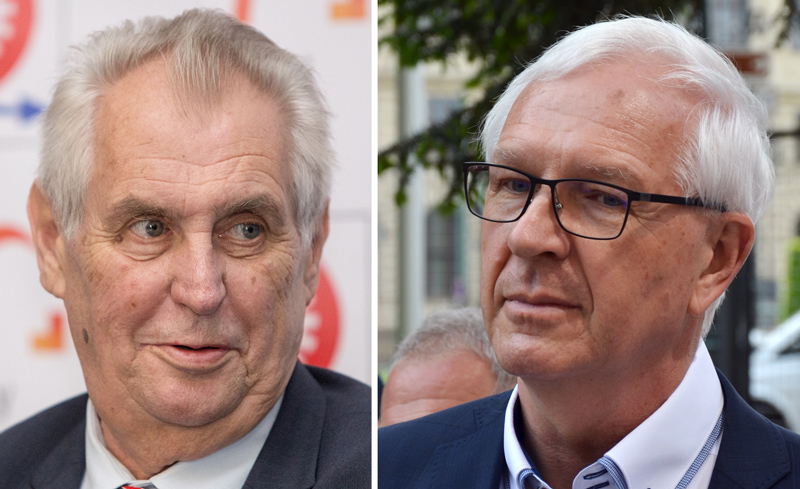|
In this mailing:
- Yves Mamou: Prison in France:
Terrorism and Islamism
- Jiri Valenta: The American
Stake in the Czech Elections
- Lawrence A.
Franklin: The U.S. and Pakistan: Time for a
Divorce?
by Yves Mamou • January 23, 2018
at 7:00 am
- Like its police and
the firefighters, France's prison guards say they live in a
permanent climate of violence and fear. And their exasperation
is growing.
- "Before, every
morning, I was afraid to discover a guy hanging in his cell.
You know what I'm dreading today? To be slaughtered, stripped,
stabbed in the back. In the name of Islam and ISIS. Every day,
on my way to work, this fear gnaws at my belly." —
'Bernard,' a French prison guard.
- "In the old
days, aggressive behavior was linked to the difficulties of
everyday life. Now hatred and violence are unleashed [by
Islamists] against [our] authority, our society and its
values." — Joaquim Pueyo, MP, former director of
Fleury-Mérogis prison.
- Instead of
understanding that the famous deradicalization centers have
not been useful because deradicalization did not take place,
France's policymakers persist in thinking that the solution to
the Islamist war is appeasement. Their new experiments all go
in the same direction: pursuing the fantasy that "if we
are nice with jihadists, they will be nice to us."

France's
Mont-de-Marsan prison. (Image source: Jibi44/Wikimedia Commons)
French prison guards are on strike. In a period of
less than 10 days, a number of guards in various prisons were
attacked and wounded, mainly by Islamists incarcerated for
terrorist offenses or petty criminals apparently on their way to
becoming radical Islamists. In reaction, the guards have blocked
the normal functioning of the majority of prisons.
The wave of attacks began on January 11, 2018. Three
guards of Vendin-le-Vieil's prison, in the north of France, were
lightly wounded in a knife attack committed by the Christian
Gantzarski, a German convert to Islam who joined Al Qaeda and
masterminded the bombing of a synagogue in Djerba, Tunisia, in
2002.
On January 15, 2018, seven guards were attacked and
injured by a "radicalized" inmate at Mont-de-Marsan
prison, in the south of France.
by Jiri Valenta • January 23,
2018 at 4:30 am
- Czech President
Milos Zeman adamantly refuses to obey the European Union
immigration quotas, even in the face of EU lawsuits.
- As for the widely
bruited charge that he is pro-Russian: In 1968, this writer, a
former classmate of Zeman's in the Prague School of Economics,
together defended the Prague reforms before hostile academic
audiences in Leningrad and Moscow just weeks before the Soviet
invasion. Expelled from the Communist Party, for his
opposition to the Soviets, Zeman was also thrice in two
decades fired from his job. In contrast, his opponent in the
run-off, Jiri Drahos, repeatedly traveled to West under the
watchful supervision of the Czech secret police.
- Zeman's defeat would
deprive Europe of a powerful voice against anti-Semitism and
Islamo-fascism. Drahos, an inexperienced leader, is more
likely to be malleable to Brussels's demands on accepting
quotas on Muslim immigration. The result of the Czech vote
will reverberate through Europe. Consequently, Zeman's
reelection is in America's national interest.

Pictured:
Czech President Milos Zeman (left) and Jiri Drahos (right), the two
contenders in the January 26-27 run-off vote for the Czech Republic
presidency. (Image source: Zeman, OISV/Wikimedia Commons; Drahos,
Jindřich Nosek/Wikimedia Commons)
The significance of the upcoming run-off of the
presidential election in Czech Republic is largely underestimated
in Washington. But its prevalent view of it as a not too
significant event in a small European country is dead wrong.
Contenders include the sitting President, outspoken
and politically incorrect Milos Zeman, who garnered 39% of the vote
in the first of a two-phase election. His rival is chemist Jiri
Drahos, the correct, low key, former president of the Czech Academy
of Sciences, who won 27%. A tight race is expected in the January
26-27 vote.
In America, Zeman's foes are led by former Secretary
of State Madeleine Albright, together with President Barack Obama's
State Department holdovers. They yearn for Zeman's defeat at they
do for the downfall of President Donald Trump, whom Zeman in some
ways resembles.
by Lawrence A. Franklin • January
23, 2018 at 4:00 am
- "The amount of
pain that Pakistan has inflicted upon the United States in the
last 12 years is unprecedented." — Amrullah Saleh,
Afghanistan's former spy chief.
- Pakistan's
Inter-Services Intelligence agency continues to sponsor,
equip, and train several terrorist organizations that directly
target American troops in Afghanistan, as well as regional
allies of the United States, such as India. The U.S. could
direct the Department of State to place Pakistan on the list
of state sponsors of terrorism.
- It is long past time
for the U.S. to choose what type of relationship it wants.
U.S.
policymakers should not have been surprised -- if they were -- at
Pakistan's decision to give refuge to Osama bin Laden, whose
hideaway (pictured) was in Abbottabad, less than a 30-minute drive
from the Pakistan Military Academy at Kakul. (Photo by Getty
Images)
U.S. President Donald Trump's recent denunciation of
Pakistan's "lies and deceit" is long overdue. Pakistani
Foreign Minister Khawajah Asif's retort -- "We do not have any
alliance" with the U.S. -- appears to administer the last
rites to a relationship long battered by mistrust. Are there,
however, sufficient U.S. interests served by maintaining military
cooperation with Pakistan, despite the contentious relationship?
Pakistan's two-faced role in joining the U.S.-led
war on terror, while at the same time giving sanctuary and
assistance to terrorist groups, was apparent even before the 9/11
attack on America and continues to this day. President Trump's
decision to withhold military aid may cause Pakistani intelligence
agencies to be even less cooperative than they were in the past in
assisting U.S. forces deployed to Afghanistan. Moreover, Pakistan's
commercial, economic, and investment interests appear now more
closely aligned with China.
|































No comments:
Post a Comment